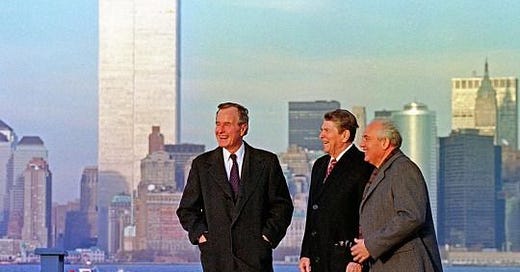Extinguishing the Hope
The spirit of the 1990s lasted for only 30 years and we're back in the dark
It may be hard to grasp for a younger generation, but there was a time when East Europe was barely accessible, it was a political, social and economic basket case. People were under the thumb of ruthless dictators like Ceaușescu and Honecker to name a few. The Soviet Union under Stalin and his successors had cast its dark shadow over what are now open and mostly free societies. I will never forget the 1980s and the deeply dividing debate in Western Europe about allowing the US to deploy cruise missiles in our countries, many arguing that we should de-escalate, disarm and let peace take its course. But a lot of us were supporting the other side, driven by US president Reagan who insisted that peace could only come about through strength. A slim majority agreed and as we know today - as morally challenging a nuclear umbrella may be - it does give a very strong measure of protection. Under the threat of nuclear escalation Russian president Putin is now bulldozing and murdering his way through Ukraine, a country that in the global power sweepstakes was dealt an incredibly poor hand.
Reagan and then Soviet leader Gorbachev negotiated a way out of the nuclear arms race, agreed to weapon reductions and in the process the Soviet Union collapsed, setting Eastern Europe free. The people of Eastern Europe had been living under a dark cloud for five decades and it was to Gorbachev’s credit that despite his apparatchik instincts he understood that Russia’s youth also wanted access to CDs, pop concerts and a shot at a better future. Borders opened and from Russia to Hungary to Bulgaria, people could freely travel again and visit lavish supermarkets, something they barely knew existed. When I visited then Czechoslovakia in 1990 and met with a family my grandfather did business with in the 50s and 60s, I will never forget the woman in her seventies saying that while she cheered the new freedoms, it was too late for her generation. The underlying sadness of that statement still resonates and it is the key to understanding the hope so many felt during those days: let’s make it better for the next generation. It led historian Francis Fukuyama to declare the end of history and inaugurated a period of enthusiasm, creativity and optimism. Not just in Europe I might add, China opened up and embraced capitalism and combined with the launch of the internet the world looked set for endless growth and happy collaboration. The roots of our tech boom can be found in the heart of the 1990s. It is even said that then president Bill Clinton lamented the absence of a real conflict or crisis, there was in a sense not that much for him to do. Things were great and were set to be even greater.
Imagine that it took some five decades to get over the lack of trust and the militarized state of the world, three decades to rebuild and now within a matter of one week things have quite literally turned to rubble. And things are far worse. Reagan, Gorbachev and Bush were men who had seen and experienced World War II and were determined to avoid a global conflict at all cost. Russia is currently unrestrained under Putin’s leadership who in eight days has managed to isolate Russia even further than the Soviet Union ever was, while doubling down on a war which make him and his pals instant war criminals. Putin in a way has already pushed the nuclear button by advancing his agenda under the now explicit threat of using these weapons of mass destruction. Russia’s attack last night on the Zaporizhzhia nuclear power plant in Ukraine made it clear Putin does not even have to hit the infamous button. Whether in this case intentional or through inept actions of his troops, his forces are on track to create incredible disasters, consequent human suffering and deep global instability.
The victory lap of the late eighties and early nineties has long run out. The resolve of western democracies to live up to the standards set by the previous generation of leaders is strained. Hoping that a palace coup will remove Putin and ensure things will get back on track is not a strategy. We are entering an immensely dark phase and we need to reignite the will and develop a joint vision to end this conflict for a better future sooner rather than later. Peace is not handed to us for free, it will only come after a long, hard, and sometimes desperate struggle against the odds. I hope we are all ready for it.
Photo: was taken on December 7, 1988, taken during Gorbachev’s visit to the UN where he delivered remarks on unilateral arms cuts, by many seen as the end of the Cold War. Yes, the Twin Towers were still standing and the Soviet Union was entering the final phase of its occupation of Afghanistan. This photo captured the hope of the twentieth century. Only Gorbachev is alive today, he turned ninety-one earlier this week. One wonders what he is thinking right now.



